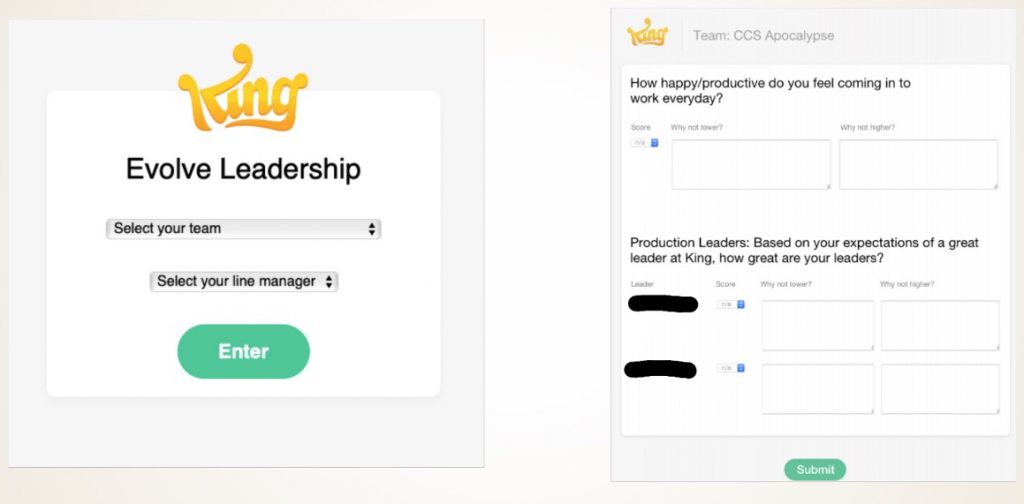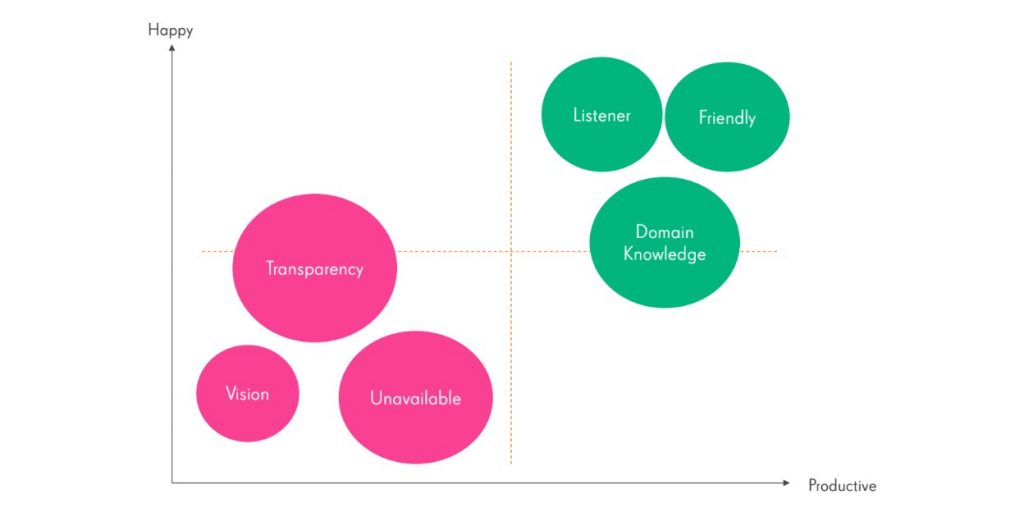Happy and high performing teams are the key to every business success.
But how can organisations truly measure happiness and performance? Can they put a number to them?
In the modern organisation, it is the managers’ responsibility to enable an environment where people can strive to be both happy and thrive in high performing teams.
Matti Klasson, Director of Agile, King Stockholm Studio, talked about using data to drive happy and high performing teams at Nordic People Analytics Summit. He presented data-driven techniques that King Stockholm studios implemented, and that can help companies measure both how good the managers are and how happy people feel.


King people stats and facts
King is a game development company and a global leader in cross-platform casual games. There’s rarely a person that hasn’t heard about the Candy Crush, Candy Crush Saga, Farm Heroes, Pet Rescue or Bubble Witch games.
King has more than 2000 employees across its 11 studios around the world, who contribute to serving King’s millions of players around the world and supporting its growth. Since its founding in 2003, their games were available solely as online games on sites and portals. King has transformed its business model throughout the years following players’ demands. In 2011 they launched their first game on Facebook which proved a huge success. However, taking heed of the faith of other games on Facebook at that time, they pivoted the company and launched the first Candy Crush on mobile in 2012. After this stage, their games’ success has been unstoppable.
Matti says that it’s important to highlight that the success of their games is also credited to the talented people working at King. It’s the leaders’ and managers’ job heading the game teams to create an environment in which employees can feel happy, productive and embrace innovation.


People principles in King
In order to create a thriving and inspiring working environment with high performing teams, King adheres to several principles.
“Make every day more fun – be the No. 1 mobile game developer”, is King’s mission and vision which they are making a reality for their players, emphasises Matti.
Another belief that they cherish is that teams with a high degree of autonomy and ownership will create more value for their players.
In the old economy paradigm where certainty was embedded in the business and industries, such as manufacturing cars, it was logical to steer, optimise and control with policies, roles and processes. But in the modern world, where there is uncertainty, it’s important to embrace and enable passion, innovation and creativity, affirms Matti.
“People need to feel like they can grow and thrive in the company and create great products for our customers,” he states. It’s all about enabling people to deliver value continuously to the customers and creating a safe environment in which they can speak openly about everything.
But how can they measure and ascertain that they have delivered this environment? The answer is “Evolve Leadership”.


Evolve Leadership
Evolve Leadership is a survey tool that King Stockholm Studios developed that they use to measure and collect data about the leadership in the company.
Employees can give feedback to their team leaders, product owners, producers, line managers, product studio, and all the way to the franchise leader and Chief Development Officer. It’s an upward feedback survey, meaning managers can’t give feedback to team members and team members can’t give feedback to their peers, explains Matti. People can only give feedback to the person in charge above their role, from the bottom up.
Survey questions and metrics
Employees are sent a link which takes them to a page that asks them to select the team they belong to and their line manager. It’s also important to emphasise that this survey is totally anonymous, which guarantees employees confidentiality, but also shows that King Stockholm studios trust their employees to choose their correct team and give accurate feedback.


When they click enter, employees are taken to a page with a simple survey with only two questions:
1. How happy/productive do you feel coming to work every day? (on a scale 1-10)
2. How great are your leaders? (on a scale 1-10).
People give scores and can add a comment in the text fields, explaining the reason for choosing the score.
The scores give King Stockholm Studios some quantitative data and indicators as to how people feel when they come to work. The accompanying free text questions “Why not higher score?” and “Why not lower score?” provide quality data and encourage people to reflect on the reasons behind their scoring.


The data from the survey
The result of the survey was more than 5,000 data points of quality and quantity data from seven rounds of running it. Matti states that they’ve also analysed the text from the comment fields and tried to tag that data with keywords to help managers parse through the feedback.
They have extracted top unique positive tags and how frequently they appear in feedback for unique leaders. Some of them are: friendly, listener, domain knowledge, feedback, approachable, available, passion, transparency, cares about the team, communication. Also, these are things that employees value and look for in their leaders. The leaders can explore these tags and the reasons behind those keywords. And what’s more important, results are updated to the system in real-time and leaders can look at raw, not aggregated data.
On the other hand, the top negative unique tags they extracted were: unavailable, lack of transparency, lack of communication, lack of vision, lack of leadership, role expectation, indecisive, not good at receiving and giving feedback, micromanagement, lack of domain knowledge. All these keywords are things that people don’t like in their leaders. The leaders can use these keywords to improve and adjust their leadership.
They collected the results from the happy and productive question and presented them according to teams. The main question King Stockholm Studio aimed to answer was “Does the ‘Leadership data correlate to ‘Happy and Productive data'”? And they got the answer that it certainly does.
What we can see from the chart below is that people who used more frequently positive tags also have a higher happy and productive score. Conversely, people who most often used negative tags, have a lower happy and productive score.


These results show that leadership is crucial for creating an environment where people can feel happy and productive in high performing teams, affirms Matti.
Final words
For leaders feeling inspired by King Stockholm Studio’s example and want to measure how happy and productive their teams are, and their leadership performance, Matti suggests to keep it simple, find local needs, try small and simple. And most importantly, steer clear from extensive engagement surveys, first test it and then scale out.















Add comment